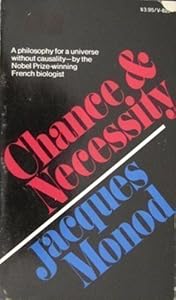 Someone reminded me of Nobelist (1965) Jacques Monod’s summation of the human condition:
Someone reminded me of Nobelist (1965) Jacques Monod’s summation of the human condition:

The ancient covenant is in pieces; man knows at last that he is alone in the universe’s unfeeling immensity, out of which he emerged only by chance. His destiny is nowhere spelled out, nor is his duty. The kingdom above or the darkness below: it is for him to choose. [Jacques Monod, Chance and necessity: an essay on the natural philosophy of modern biology (New York: Knopf, 1971), p. 180.]
Monod (1910–1976) apparently equated the “kingdom above” with “scientific socialist humanism”. But in the end, socialism wasn’t the kingdom above. And many decided that yes, chance rules. But we are not alone! Nor is our universe. We can believe, if we dare, that there is an infinity of universes out there. And that is why what looks like design in our universe (much of which Monod might not have known about) is really just chance.
One wonders what Monod would have made of the multiverse. He died of leukemia during a period when it is fair to say that it was still ”a fringe interest of dubious scientific validity“. Because evidence still mattered back then.
See also: “But who needs reality-based thinking anyway? Not the new cosmologists” and Science Fictions – O’Leary for News